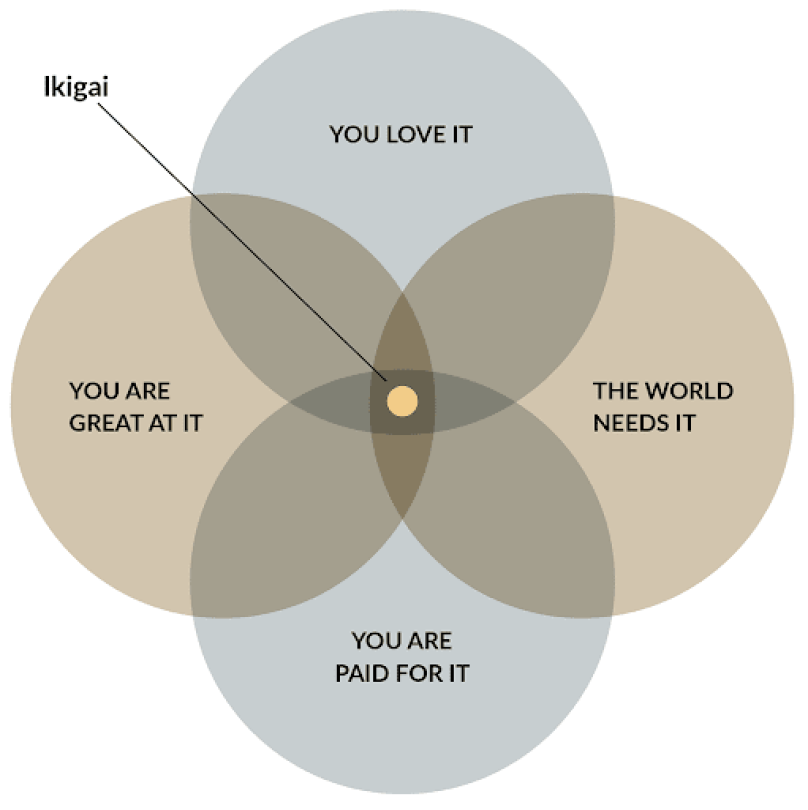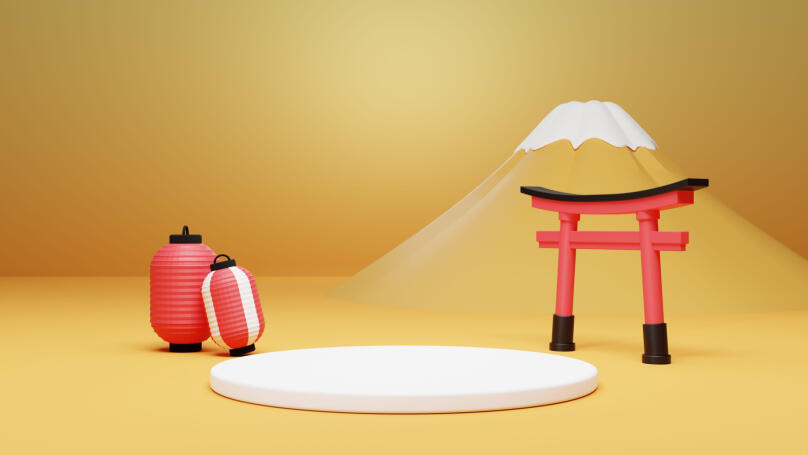Ikigai

What is ikigai?
Ikigai is the Japanese art of living. The meaning of this term is rooted in philosophical practices. It is believed that ikigai is one's life goal, which also means the path to true happiness and is individual to each person. However, in the Western world, ikigai has a more down-to-earth meaning. It stands for finding a career path that will suit a particular individual. According to the basic concept, ikigai has four components: what you enjoy doing; what you can do well; what you are paid for; and what the world needs.
The origin of ikigai
The concept of ikigai originated in Japan. Historians believe the word "ikigai" appeared first back in the Heian period (794-1185). At the same time, historians discovered several similar words: hatarakigai, that is, "the value of work," and yarigai, meaning "something worth doing." The earliest modern references to ikigai appeared online in 1996 when Gordon Mathews wrote a book called "What Makes Life Worth Living?". Yet, the very concept was only popularised in 2009, when Dan Buettner gave a TED talk on ikigai, after which the philosophy spread around the West and the rest of the world.
Hector Garcia, author of the acclaimed book "Ikigai: The Japanese Secret to a Long and Happy Life," interviewed 100 elderly residents of the village of Ogimi in Okinawa Prefecture. This village was chosen for a reason: it is known throughout the world as a village of centenarians, allegedly due to the fact that each of its inhabitants has their own ikigai. For some, ikigai has become an art of living, while others find it in their close friends and family. Every person from this village knows exactly what is the meaning of their life and what makes them happy. They have strong social ties with others and adhere to certain principles, despite their age. It is also interesting that, according to another Japanese study, Japanese over the age of 65 do not experience cognitive decline, unlike people of the same age in the rest of the world. Yet, it happens only if they work for their ikigai, and not for money.
By the way, a similar study was conducted by representatives of the TV program "Takeshi no katei no igaku" in 2017, in the city of Kyotango in Kyoto Prefecture. It is also home to centenarians. When studying blood tests of local residents, they learned that all the "subjects" had a high level of steroid hormone, which is secreted by the adrenal glands. Modern scientists consider it to be the hormone of longevity. At the same time, all the residents of Kyotango participating in the study engaged in their hobbies every day: they painted, fished, carved masks from wood, and so on.
Ikigai diagram
The concept of ikigai can be reflected in the following diagram:

Ikigai stands at the very centre of the circles in the diagram. These are areas of interest in a person's life. Here are the circles that are usually included in the ikigai chart:
-
You love it
The first circle is what you especially like doing. These things bring you the greatest joy, and you anticipate them, wanting to do more of them. It doesn't have to be a job or a hobby; it could even be sleeping or eating. Generally anything.
-
You are great at it
This includes everything you are especially good at: hobbies, skills you use at work, talents that make you different from others, and individual character traits (for example, a high level of empathy). It can even be some part of your working day: for example, you are great at making coffee in the morning or cheering up the whole office, even when you are away.
-
The world needs it
People around you demonstrate their need for what you enjoy doing and what you are good at. For example, your relatives, friends, social media followers, your boss or partner are talking about it. It can also be a global need, for example, clean drinking water, education available to everyone, and so on.
-
You are paid for it
Finally, most importantly, you are paid a lot! In this way, the market shows that it is interested in your talent. This may not be your main job, but something related to a hobby or area that you previously did not pay professional attention to. You should also take into account not real, but only potential opportunities for monetising a particular business.
The 10 rules of ikigai

The meaning of ikigai is well illustrated by its ten rules:
-
Stay active
Ikigai encourages you not to give up on what you enjoy doing and what you are good at, no matter the circumstances. It also means not retiring, which is why the Japanese continue to work and actively pursue their hobbies, no matter how old they are.
-
Don't rush
Quoting one of the books about ikigai, "Being in a hurry is inversely proportional to the quality of life." If you want to live well, you should slow down and take your time, thereby controlling yourself and paying attention to your decisions and the situations in which you find yourself every day.
-
Don't overeat
Yes, there is such a rule in ikigai. To stay healthy longer, ikigai recommends eating a little less than your hunger demands. In Japan, there is a term "Hara hachi bu" meaning "Eat until you are 80% full."
-
Surround yourself with good friends
According to ikigai, friends are the best cure for boredom. So, do not isolate yourself from others. People who refuse to socialise cannot have ikigai. Some philosophers believe that ikigai can suddenly appear even in interpersonal relationships! For example, you can learn that your life's purpose is to take care of your children.
-
Take care of your body
Ikigai compares the human body to water: it is best when it flows fresh and does not stagnate, as it is in its nature to move and change. Similarly, the human body needs daily care, regardless of age. Thus, you should cater to its needs and regularly exercise.
-
Smile more
Well, this is easy: smiling helps you relax and make new friends. Ikigai also means being thankful for waking up today and getting a chance to live another day, doing something important and interesting, or helping someone.
-
Reconnect with nature more often
You can just take a walk in the park or forest if you live nearby. After all, according to ikigai, people are created to be part of nature, as they have come from it. Nowadays, we cannot abandon our daily tasks to stay outside, yet we can return to nature to recharge our batteries.
-
Give thanks
We are talking about the traditional practices of gratitude you know well. Thank your ancestors, the surrounding nature, the food you eat, friends and acquaintances, your family, the opportunity to work, engage in hobbies, etc. This will inevitably affect your mood and physical well-being.
-
Live in the moment
Don't regret the past. You can no longer change it. Don't fear the future - it is not as scary as it might seem. Try to live in the present, being grateful for every waking moment of your life. Judging by these rules, ikigai is a whole philosophy, and not just a way to live a long life. In the end, the present is all you have.
-
Trust and follow your ikigai
The last rule of ikigai sounds ironic, but it is true. Believe in your talent, in what gives your life meaning. If you still don't know what your ikigai is, trust that you will find it, and genuinely look for it. In general, do not expect it to fall from the sky!
How to find your ikigai

How do you find your ikigai? How do you explore what can become your life's work? Get started with these steps!
- Ikigai questionnaire
Think about what brings you joy. What activities or hobbies allow you to almost forget about everything around you? What are you especially interested in doing? What do you not get tired of? What did you enjoy doing before? What inspires you? What makes you angry and upset? What values do you have? What are your strengths? What activities energise you and at the same time can be considered your strong point? What are your skills and competencies? Which of them are especially well-developed? Courses or workshops on which topics do you most often take? What could you teach other people? What product or service could you create with the best intentions?
- Visualisation
After you fill out the questionnaire in detail and honestly, you will need to write out the most repeated topics and keywords. Imagine how these topics could look in reality. What could be at their intersections? Think about it until you feel that the fantasy is quite real and can come true.
- Roadmap
Now you need to create a plan for incorporating the topics and keywords we covered earlier into your life even more. You need to come up with rituals to fit even more hobbies and inspiring activities into your life. Think about what new or already forgotten hobbies you could try. Another task is to look at your career as a portfolio investment and consider what projects you could earn money on. Portfolio investment means investing in several securities from different companies. It is the same with the career! You don't have to live with only one source of income.
Ikigai books

What are the best books on ikigai? Here is our list of books about this art of living.
-
"Ikigai: The Japanese Secret to a Long and Happy Life" by Francesc Miralles and Hector Garcia
This is the book about ikigai. It is a good starting point for a journey through the world of this exciting Japanese philosophy, presented with interesting stories and examples. Here you will find interviews with people who live according to ikigai and their recommendations for readers.
-
"Ikigai for Leaders and Organisations" by Frank Brueck
If you're looking for a tutorial for coordinating your employees according to ikigai, you've just found it. This edition provides applied knowledge, filled with real examples of ikigai in business and life. This is right up your alley if you have already read everything you wanted about the philosophical part of the issue and now you want to understand how to apply the concept in real life.
-
"Ikigai: Giving Every Day Meaning and Joy" by Yukari Mitsuhashi
This is the first Japanese author on our list of the best ikigai books! Yukari grew up in Japan and therefore knows the concept she writes about very well. She explains ikigai in simple terms and discusses how the idea is extrapolated to one's career. Read it if ikigai seems complicated and confusing to you.
Ikigai quotes
"Essentials to happiness in this life are something to do, something to love, and something to hope for."
Hector Garcia, Ikigai: The Japanese Secret to a Long and Happy Life
"Life is not a problem to be solved."
Hector Garcia, Ikigai: The Japanese Secret to a Long and Happy Life
"Walk slowly and you'll go far."
Hector Garcia, Ikigai: The Japanese Secret to a Long and Happy Life
"Everything can be taken from a man but one thing: the last of the human freedoms - to choose one's attitude in any given set of circumstances, to choose one's own way."
Hector Garcia, Ikigai: The Japanese Secret to a Long and Happy Life
"There is nothing wrong with enjoying life's pleasures as long as they do not take control of your life as you enjoy them."
Hector Garcia, Ikigai: The Japanese Secret to a Long and Happy Life
"He who has a why to live for can bear with almost any how."
Hector Garcia, Ikigai: The Japanese Secret to a Long and Happy Life
"Excellence, then, is not an act but a habit. -Aristotle."
Hector Garcia, Ikigai: The Japanese Secret to a Long and Happy Life
"Be led by your curiosity."
Hector Garcia, Ikigai: The Japanese Secret to a Long and Happy Life
Conclusion
There are many myths surrounding ikigai, the concept of finding the true meaning of one's life. However, ikigai is not exclusively related to work or finances. It can be expressed both in professional and personal growth. It could be about your family, the flowers on your windowsill, or the tea you pour for your neighbours. Ikigai is a process, not an all-or-nothing formula. And any process has bad days and failed attempts. There may be a few ikigai in your life, and that's perfectly fine too! Life is not so easy to focus on just one goal. Seek and you will surely find what you are looking for. Perhaps your ikigai will surprise you and the whole world.























